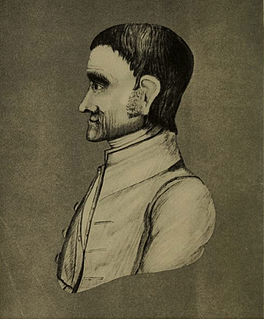A Quote by Ambrose Bierce
PHILISTINE, n. One whose mind is the creature of its environment, following the fashion in thought, feeling and sentiment. He is sometimes learned, frequently prosperous, commonly clean and always solemn.
Related Quotes
Thus He whose tender mercies are over all His works hath placed a principle in the human mind, which incites to exercise goodness towards every living creature; and this being singly attended to, people become tender-hearted and sympathizing; but when frequently and totally rejected, the mind becomes shut up in a contrary disposition.
The average mind requires a change of environment before he can change his thought. He has to go somewhere or bring into his presence something that will suggest a new line of thinking and feeling. The master mind, however, can change his thought whenever he so desires. A change of scene is not necessary, because such a mind is not controlled from without. A change of scene will not produce a change of thought in the master mind unless he so elects.
There is always great beauty, not of images, feeling or thought. Beauty is neither thought nor feeling; it has nothing whatsoever to do with emotion or sentiment. There is fear. Fear is never an actuality; it is either before or after the active present. When there is fear in the active present, is it fear? It is there and there is no escape from it, no evasion possible. There, at that actual moment, there is total attention at the moment of danger, physical or psychological.
Let us record the atoms as they fall upon the mind in the order in which they fall, let us trace the pattern, however disconnected and incoherent in appearance, which each sight or incident scores upon the consciousness. Let us not take it for granted that life exists more fully in what is commonly thought big than in what is commonly thought small.
There is a certain sort of man whose doom in the world is disappointment, who excels in it, and whose luckless triumphs in his meek career of life, I have often thought, must be regarded by the kind eyes above with as much favor as the splendid successes and achievements of coarser and more prosperous men.
Just keep in mind the feeling 'I am', merge in it, till your mind and feeling become one. By repeated attempts you will stumble on the right balance of attention and affection and your mind will be firmly established in the thought-feeling 'I am'. Whatever you think, say, or do, this sense of immutable and affectionate being remains as the ever-present background of the mind.
The country and culture commonly known as "America" had had a badly split personality all through its history. Its overt laws were almost always puritanical for a people whose covert behavior tended to be Rabelaisian; its major religions were all Apollonian in varying degrees---its religious revivals were often hysterical in a fashion almost Dionysian.
I was in the sixth grade and living in Germany, when I was hanging out late with some friends. I turned around, and there's a dude dressed up as Michael Myers following us all the way home. It was the scariest thing ever, and it always reminds me of Halloween. In my mind, I was so young, so I really thought it was Mike Myers following me home.































